 |
 |
 |
| |
LONGITUDINAL ANALYSIS SHOWS NO EVIDENCE
FOR ACCELERATED BRAIN AGEING IN TREATED HIV
|
| |
| |
Reported by Jules Levin
CROI 2017 Feb 14-16 Seattle, WA
James Cole1, Matthan Caan2, Jonathan Underwood3, Rosan van Zoest4, Davide de Francesco5, Alan Winston3, Caroline Sabin5, David Sharp1, Peter Reiss4,6
on behalf of the COBRA (CO-morBidity in Relation to AIDS) collaboration.
1Computational, Cognitive & Clinical Neuroimaging Laboratory, Imperial College London, UK. 2Brain Imaging Centre, Academic Medical Center Amsterdam, Netherlands. 3Division of Infectious Diseases, Imperial College London, UK.
4Department of Global Health, Academic Medical Center Amsterdam, Netherlands. 5Department of Infection & Population Health, University College London, UK. 6Dutch HIV Monitoring Foundation, Amsterdam, Netherlands

from Jules: described in another poster which found: "Biological age was significantly greater than chronological age by 13.2 (95% CI: 11.6, 14.9)years in the HIV+ve group and by 5.5 (3.8, 7.2) years in the HIV-ve group (p<0.001 for each) with a significant difference between the two groups (p<0.001)." Which you might think suggests you would find a difference in decline in brain function in this analysis but they do not see it in this analysis which I will comment on, and question their result.
The COBRA collaboration
The COBRA cohort study investigates the potential link between HIV and age-associated comorbidities in a cohort of older HIV+ve individuals on cART and otherwise comparable HIV-ve controls in the UK and the Netherlands.
134 HIV+ve individuals aged ≥45, on cART and with a plasma HIV viral load <50 copies/mL for ≥12 months prior to enrolment were recruited at HIV outpatient clinics; 79 similarly aged HIV-ve controls with comparable socio-demographic and lifestyle characteristics, were recruited from sexual health centers.
COMMENTS from Jules: I remain unconvinced by this study conclusion. Observations on this study by neurologic researchers at CROI differed, some felt this was a great study and supports that HIV+ initially take a "hit" on brain function that levels off on cART and support this study author's conclusion that "on cART this analysis does not find evidence for brain aging to be accelerated over time during continued viral suppression". Other neurologic researchers at CROI I spoke with who were at CROI felt this study design had flaws and they disagree with the author's conclusions. Looking at Table 2 you see that at baseline HIV+ had worse overall brain functioning in a number of neuroimaging tests & neuropsychologic functioning tests. I remain unconvinced of this study conclusion that HIV+ brain decline is not worse than HIV-negatives & is not accelerated presumably because decline over 2 years was no worse than the control group & both groups had declines that were however similar. First, the poster says the control group was "demographically comparable" and if you look at the other poster which has baseline characteristics you see similarities but only in the characteristics they looked at. Here is that table below.
They do not list comorbid conditions, was their a difference in diabetes, hypertension, CVD etc between HIV+ & HIV-neg group. The control group was from a sexual health clinic so you might assume it is not your usual HIV-neg health control group but as the study says - a similar group as the HIV+. The study does not separate out among the HIV+ group by certain characteristics that might predict worse brain decline: CD4 nadir (which in other studies predicts neuro decline), history of cocaine & methamphetamine use, immune activation & inflammation. One more point, studies find that once a person hits 60 years of age that is a point at which worse slope of decline in brain function can occur, and this study looks for only 2 years followup which might be too short in and of itself, and you see in Table 1 the average age is 57 for study participants with a range from about 50 to 64 suggesting that most study participants are in their 50s before more rapid decline inHIV+ might occur. Other studies in HIV as I recall in CVD & bone find similar declines in HIV+ compared to HIV-neg but after around 60 the slope of decline separates between HIV+ and HIV-neg. Senescence in people in general sets in around 60 so if HIV+ have worse immune markers & function & have more senescence their decline immune function might be more precipitous but this was not considered in this study analysis. As I refer to above the other COBRA poster found biological age significantly greater in HIV+ vs HIV-neg for the same HIV+ group & HIV- control group presumably by about 8 years, but in this study found no difference in brain function decline, over again a relatively brief 2 year followup. I take difference with them on their findings and conclusion.
You can look at this report from CROI 2011 - http://www.natap.org/2011/CROI/croi_123.htm - that includes 3 studies - one finding as others that HIV enters the brain immediately after infection & causes damage they reported, the 2nd study found brain damage persists, and the 3rd study found brain damage continues to unfold on stable cART. We know many studies have found ongoing cognitive & neurologic brain decline in HIV+ on ART, so it confounds thinking that cART prevents worsening decline compared to this study HIV-neg comparison group and therefore we can conclude that HIV does not accelerate brain decline, even though this study was only for 2 years followup. Then this study finds as it says in conclusions: "Cognitive Performance did not decline over 2 years - see Table 2 where their data supports that conclusion. So I remain unconvinced, 6 tests of neuropsychological testing found there was no decline over this 2 year followup in HIV+ or HIV- except for attention which did decline only in HIV- but not in HIV+. Am I to believe this means as they Conclude: "Although we previously found evidence for increased brain age in this cohort of PLWHIV, this analysis does not find evidence for brain aging to be accelerated over time during continued suppressed viraemia on cART". I remain unconvinced, this study just may not have been designed in a way to find that evidence. And finally again the control comparison group for this study declined similarly in neuroimaging but it is not a normal healthier control group. In conclusion we need well designed, well- controlled studies to evaluate this question. Right now 80% of HIV+ in many big cities are over 45, 50% over 50, and 20% over 60, this trend towards aging will of course increase and neuralgic & cognitive function will be a big concern.
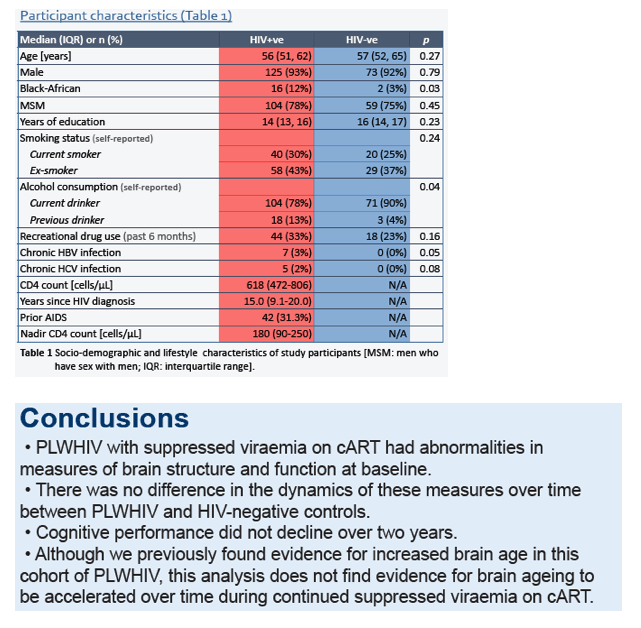
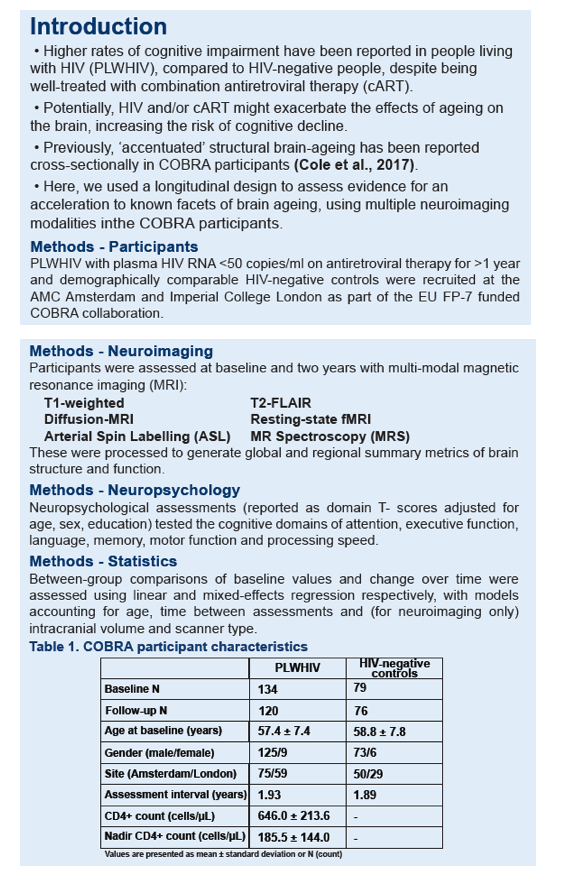
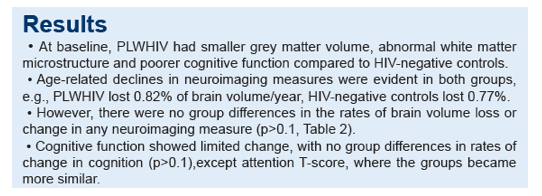
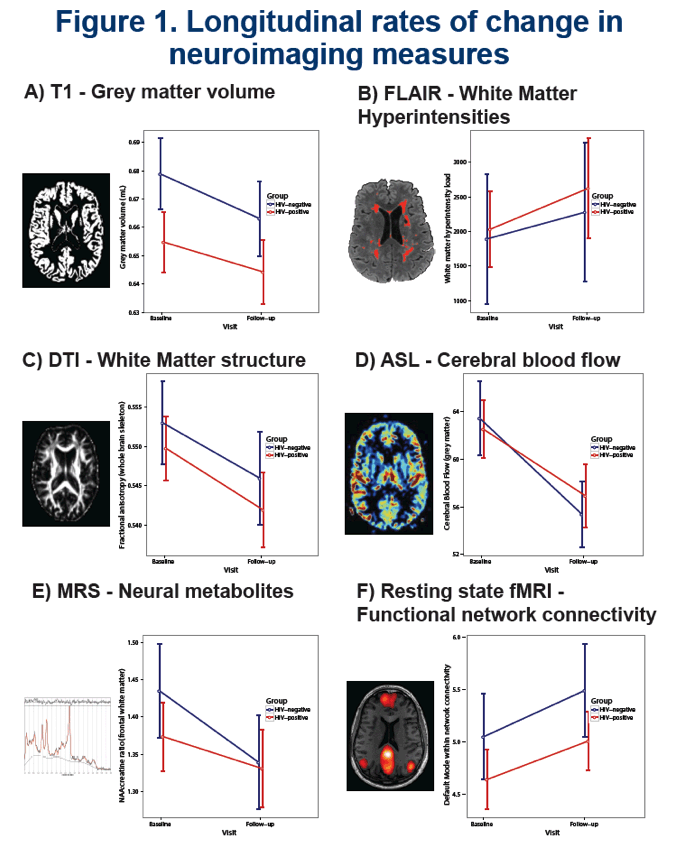
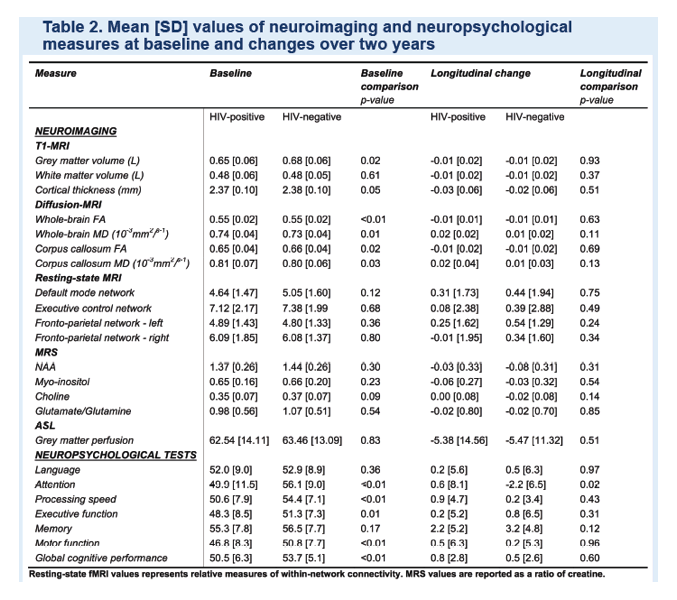
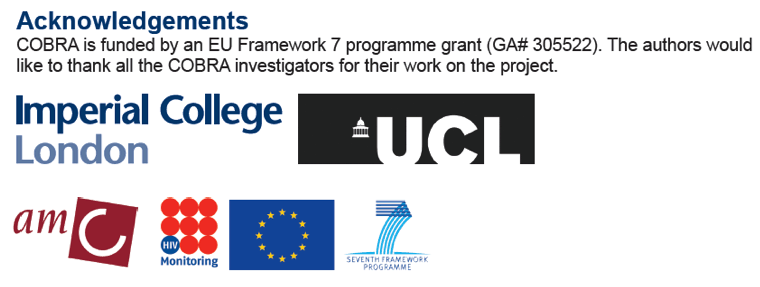
|
| |
|
 |
 |
|
|